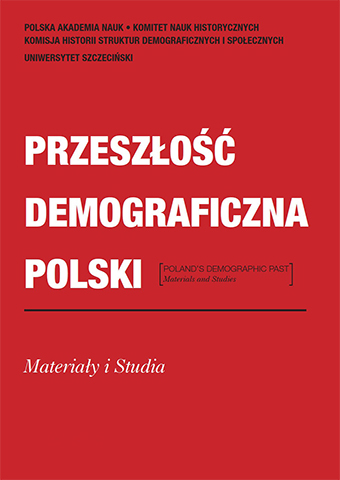| 1. | Berdahl, Robert M. The Politics of The Prussian Nobility. The Development of a Conservative Ideology 1770–1848. Princeton: Princeton University Press, 1988. |
| 2. | Bernardi, Laura. An Introduction to Anthropological Demography. MPIDR Working Paper 2007-031. Rostock: Max Planck Institute for Demographic Research, 2007. Dostęp 9.09.2018. https://www.demogr.mpg.de/papers/working/wp-2007-031.pdf. |
| 3. | Blasius, Dirk. „Bürgerliche Rechtsgleichheit und die Ungleichheit der Geschlechter. Das Scheidungsrecht im historischen Vergleich“. W: Bürgerinnen und Bürger. Geschlechterverhältinsse im 19. Jahrhundert, red. Ute Frevert. Göttingen: Vandenhoeck & Ruprecht, 1988. |
| 4. | Blasius, Dirk. Ehescheidung in Deutschland 1794–1945. Göttingen: Vandenhoeck & Ruprecht, 1987. |
| 5. | Brunet, Guy, Alain Bideau. „Démographie historique et généalogie”. Annales de Démographie Historique 2 (2000): 101–110. |
| 6. | Buchsteiner, Ilona. „Pommerscher Adel im Wandel des 19. Jahrhunderts”. Geschichte und Gesellschaft 25 (1999): 342–374. |
| 7. | Cybal-Michalska, Agnieszka. „Podmiot i struktura społeczna w teorii A. Giddensa – rekonstrukcja i krytyka”. Teraźniejszość – Człowiek – Edukacja 62 (2013), 2: 7–31. |
| 8. | Dieterich, Hartwig. Das protestantische Ehehrecht in Deutschland bis zur Mitte des 17. Jahrhunderts. München: Claudius Verlag, 1970. |
| 9. | Dupâquier, Jacques. „Genealogia i demografia historyczna”. Ruch Prawniczy, Ekonomiczny i Socjologiczny 43 (1981), 4: 313–322. |
| 10. | Frątczak, Ewa. „Rodzina: refleksje nad zmianą i jej kontekstem teoretycznym”. W: O racjonalną politykę rodzinną. Rodzina formacją niezastąpioną? Księga Jubileuszowa Profesor Bożeny Balcerzak-Paradowskiej, red. Marek Bednarski, Zofia Czepulis-Rutkowska, Dorota Głogosz, 28–44. Warszawa: Centrum Partnerstwa Społecznego „Dialog” im. Andrzej Bączkowskiego, 2017. |
| 11. | Frątczak, Ewa. Monika Młynarska. „Badania jakościowe na użytek demografii”. Studia Demograficzne 152 (2007), 2: 3–22. |
| 12. | Frevert, Ute. Mąż i niewiasta. Niewiasta i mąż. O różnicach płci w czasach nowoczesnych. Warszawa: Oficyna Wydawnicza Volumen, 1997. |
| 13. | Gleixner, Ulrike. „Geschlechtergeschichte verändert Geschichtsbilder: Das zweifache Leben der Effi Briest”. W: Faltenwürfe der Geschichte. Entdecken, entziffern, erzählen, red. Sandra Maβ, Xenia von Tippelskirch, 366–384. Frankfurt–New York: Campus Verlag, 2014. |
| 14. | Guzowski, Piotr. „Demografia rodziny szlacheckiej w świetle najnowszych badań genealogicznych”. Przeszłość Demograficzna Polski 20 (2001): 7–23. |
| 15. | Johnson-Hanks, Jennifer A., Christine A. Bachrach, Philip S. Morgan, Hans-Peter Kohler. Understanding Family Change and Variation: Toward a Theory of Conjunctural Action. Dordrecht: Springer, 2011. |
| 16. | Johnson-Hanks, Jennifer. „What Kind of Theory for Anthropological Demography?” Demographic Research 16 (2007): 1–26. |
| 17. | Kulesza-Woroniecka, Iwona. Rozwody w rodzinach magnackich w Polsce w XVI–XVIII wieku. Poznań–Wrocław: Wydawnictwo Historyczne, 2002. |
| 18. | Menning, Daniel. Standesgemäβe Ordnung in der Moderne. Adlige Familienstrategien und Gesellschaftsentwürfe in Deutschland 1840–1945. München: Oldenbourg Verlag, 2014. |
| 19. | Paletschek, Sylvia. „Adelige und Bürgerliche Frauen (1770–1870). W: Adel und Bürgertum in Deutschland 1770–1848, red. Elisabeth Fehrenbach, 159–185. München: Oldenbourg Verlag, 1994. |
| 20. | Reif, Heinz. Adel im 19. und 20. Jahrhundert. München: Oldenbourg Verlag, 1999. |
| 21. | Schiller, René. Vom Rittergut zum Grossgrundbesitz. Ökonomische und soziale Transformationsprozesse der ländlicher Eliten in Brandenburg im 19. Jahrhundert. Berlin: Akademie Verlag, 2003. |
| 22. | Sewell, Jr. William H. „A Theory of Structure: Duality, Agency and Transformation”. American Journal of Sociology 98 (1992), 1: 1–29. |
| 23. | Stępiński, Włodzimierz. „Procesy integracyjne w obrębie rodów szlacheckich na Pomorzu Zachodnim”. W: Rodzina pomorska, red. Józef Borzyszkowski, 170–189. Gdańsk: Nadbałtyckie Centrum Kultury, Instytut Kaszubski, 1999. |
| 24. | Szołtysek, Mikołaj. „Antropologiczna demografia, demograficzna antropologia. W stronę hybrydalnych obszarów badawczych”. Lud. Organ Polskiego Towarzystwa Ludoznawczego i Komitetu Nauk Etnologicznych 90 (2006): 177–191. |
| 25. | Szołtysek, Mikołaj. „Czy antropologia »odkupi« demografię”. Historyka. Studia Metodologiczne 35 (2005): 171–183. |
| 26. | Szołtysek, Mikołaj. „Od strategii przetrwania do międzypokoleniowej wymiany – perspektywa antropologiczna w badaniach nad rodziną, gospodarstwem i pokrewieństwem”. Przeszłość Demograficzna Polski 23 (2002): 143–163. |
| 27. | Szudra, Dariusz. „Kryzys małżeństwa a I wojna światowa na przykładzie rozwodów w Prusach, z uwzględnieniem tzw. Wielkiego Niemieckiego Wschodu”. W: Rodzina i gospodarstwo domowe na ziemiach polskich w XV–XX wieku. Struktury demograficzne, społeczne i gospodarcze, red. Cezary Kuklo, 531–572. Warszawa: Wydawnictwo DiG, 2008. |
| 28. | Szultka, Zygmunt. „Dynamiczne przeobrażenia wsi i rolnictwa w drugiej połowie XVIII i początkach XIX wieku”. W: Historia Pomorza, red. Gerard Labuda. T. 2: do roku 1815, cz. 3: Pomorze Zachodnie w latach 1648–1815, 567–653. Poznań: Wydawnictwo Poznańskie, 2003. |
| 29. | Szultka, Zygmunt. „Stosunki religijne i kościelne”. W: Historia Pomorza, red. Gerard Labuda, T. 2: do roku 1815, cz. 3: Pomorze Zachodnie w latach 1648–1815, 842–874. Poznań: Wydawnictwo Poznańskie, 2003. |
| 30. | Szultka, Zygmunt, Alfred Wielopolski. „Wpływ wydarzeń politycznych na sytuację na Pomorzu Zachodnim”. W: Historia Pomorza, red. Gerard Labuda, T. 2: do roku 1815, cz. 3: Pomorze Zachodnie w latach 1648–1815, 749–786. Poznań: Wydawnictwo Poznańskie, 2003. |
| 31. | Treskow von, Rüdiger. „Adel in Preußen: Anpassung und Kontinuität einer Familie 1800–1918”. Geschichte und Gesellschaft 17 (1991): 344–369. |
| 32. | Wienfort, Monika. Der Adel in der Moderne. Göttingen: Vandenhoeck & Ruprecht, 2006. |
| 33. | Wienfort, Monika. Verliebt, Verlobt, Verheiratet. Eine Geschichte der Ehe seit der Romantik. München: C.H. Beck, 2014. |
| 34. | Wrzosek, Wojciech. „Po co nam badania nad mentalité?”. W: Historia – mentalność – tożsamość. Studia z historii, historii historiografii i metodologii historii, red. Karolina Polasik-Wrzosek, Wojciech Wrzosek, Leonid Zaszkilniak, 369–371. Poznań: Instytut Historii UAM, 2010. |








